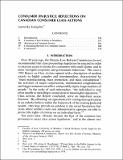| dc.description.abstract |
Over 30 years ago, the Ontario Law Reform Commission (OLRC) recommended that class proceedings legislation be enacted in order to increase access to justice for consumers with small claims, and to deter wrongful corporate and government behavior. The OLRC´s 1982 Report on Class Actions opened with a description of modern society as highly complex and interdependent, characterized by ¨mass manufacturing, mass production, and mass consumption¨; the activities of major corporations, international conglomerates and big government can affect, and possibly injure, large numbers of people. In the wake of such misconduct, ¨the individual is very often unable or unwilling to stand alone in meaningful opposition¨. Class actions, the Report concluded, serve an important access function: ¨By affording `an opportunity for voicing mass grievances in an orderly fashion within the framework of the existing [judicial] system´, they may provide an antidote to the social frustration that exists where neither courts nor administrative agencies are able to protect the rights of citizens on an individual basis. |

